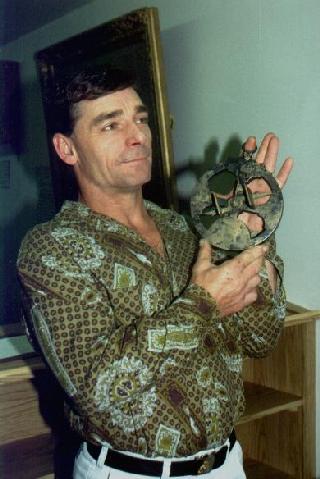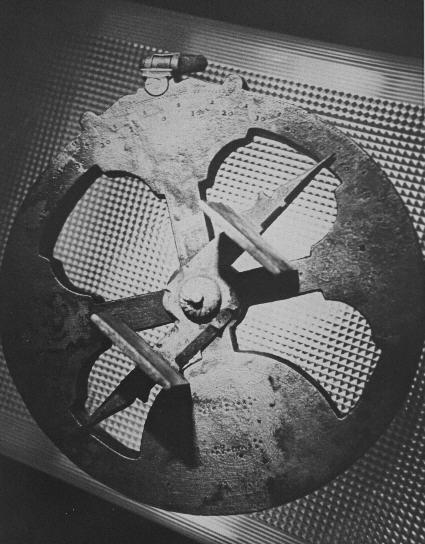
Wayne Mushrow discovered the Astrolabe on November 26,1981 at Isle Aux Morts, Newfoundland, Canada. With steel wool and oven cleaner he removed the black encrustation that had covered it. He realized whatever he had found was in excellent condition. Now he could see it was some sort of navigational instrument and set out to learn what it really was. What was this object? Where did it come from? It was dated 1628 and carried the inscription DYAS. It was made of solid brass, weighed nine pounds and nine ounces, and measured three quarters of an inch in thickness. Wayne was really curious by now. After searching through encyclopedia, dictionaries and navigation books he found it was ancient Astrolabe. The Astrolabe is an instrument that was invented by the ancient Greeks for observing heavenly bodies. By the fifteenth century it was adopted for use in navigation. Only one was ever found in Canada -Champlain's Astrolabe. It was discovered in 1867 at Cobden Ontario by George Lee who sold it to an American. It was later owned by the New York Historical Society, and was recently purchased by and returned to the Canadian government. Suspecting its great value and historical importance He contacted museums and historical agencies in Canada, England, and the U.S.A. Photographs of the object was sent showing the excellent condition of this item clearly dated 1628. The response was quick and enthusiastic. He had found an Astrolabe -an instrument used by the early navigators to determine latitude. This rare instrument was indeed a valuable historical find. Unlike some of the other astrolabes the Mushrow Astrolabe was in excellent condition with all of its components intact.
A.N. Stimsin, Curator of navigation at the National Maritime Museum at Greenwich, England responded in part: In his efforts to get the proper credit for his historical discovery, and to keep the treasure in the local area things got a little rough for Wayne Mushrow. At first the Provincial Government did not show much interest while historical groups around the world were hungry for such artifacts. Mr Mushrow was excited about the impact his discovery could have on the tourist trade and benefits the local town of Port Aux Basques could realize. One of his requests was that the historical navigational tool remain in the museum in town.
The Newfoundland Government preferred to have the astrolabe totally as its own. Mr. Mushrow decided to keep the artifact until some of his wishes were agreed to. He was accused of extortion and warned he could face as much as 12 years imprisonment for his actions. Mr. Mushrow charged that one representative went so far as to congratulate him for being an upstanding citizen, then turned around and smuggled an undercover cop into his residence with a search warrant.
 Promises of a reward in the form of tax breaks,personal recognition for his discovery and compensation for his expenses in finding the astrolabe finally convinced the diver to accept the government at their word. Three or four days after his final meeting with Dave Martin, an advisor to the premier at the time, Mr. Mushrow turned the astrolabe over to the Port Aux Basques Detachment of the RCMP. Ten years later Mr. Mushrow still said he "never got so much as a thank you". "The Provincial Historic Objects, Sites and Records Act" gives the Crown ownership of such discoveries to protect them for the benefit of all Newfoundland and Labradorians. So, in February 1982 Wayne Mushrow officially turned over the astrolabe and the other items found at the wreck to representatives of the Newfoundland Department of Culture and Recreation. This was not to be the end of the stormy relationship between Mr. Mushrow and the Nfld government. His struggle to get full benefits for the town of Port Aux Basques would still continue. Incredibly, rumours of the later discovery of a second astrolabe was to complicate matters even more. |